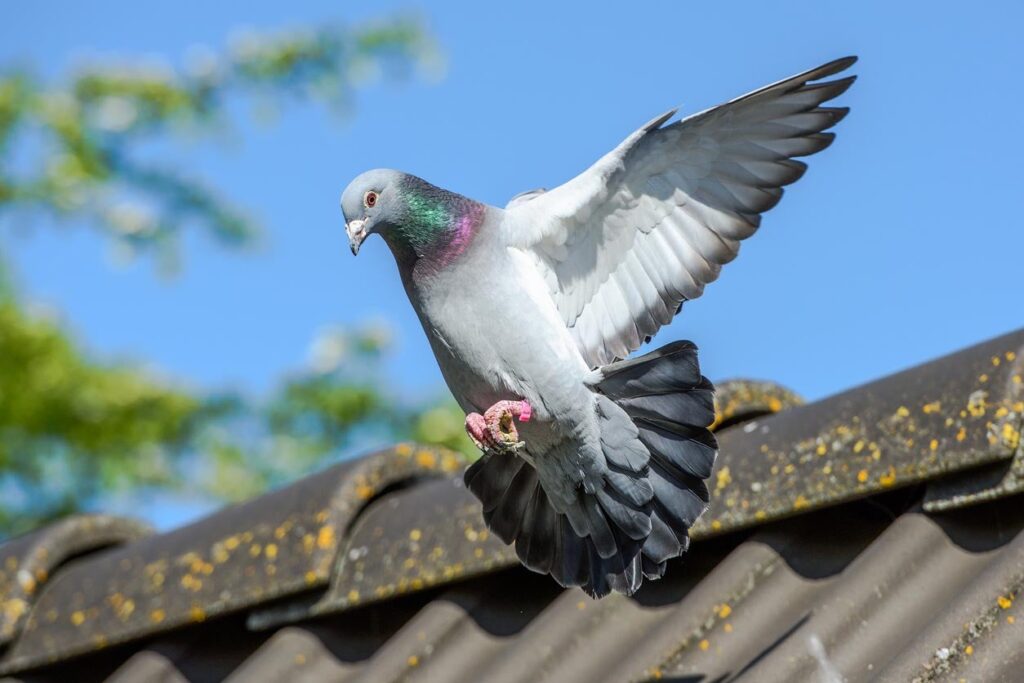
There are a few signs that suggest a bird is occupying your interior or exterior living space. By identifying them, you are better equipped to make the best decisions for bird removal. It’s important to act quickly when you recognize the signs of bird problems before any issues develop.
When you notice those signs, don’t hesitate to contact Critter Control. Our experienced technicians can help you evict your unwanted feathered guests, ensuring your home remains free of bird problems.
Bird Droppings
The easiest way to identify that a bird is occupying your space is by its telltale white droppings.
Why Is Bird Poop White?
Birds don’t have separate exits for urine and feces like mammals. Instead, all waste is expelled at once through the cloaca. Birds convert nitrogen, which is expelled in the urine of mammals, to uric acid or guanine. This uric acid is a white, sticky paste with a dark center (the actual poop). Some areas of the house or yard may be appealing for birds as sites to settle or congregate, causing a buildup of bird droppings that is both unsightly and potentially dangerous.
How to Tell Bird Poop Apart From Other Animals
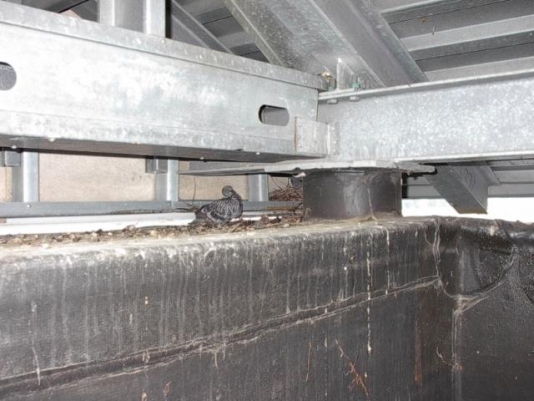
Similar to birds, snakes also have cloacas and white coloration in their feces. Bird feces are typically whiter and more liquid than snake feces because of their high uric acid, whereas snake feces are often more solid, dark, and elongated and contain traces of undigested prey, like birds and fur. Raptors’ and owls’ excrement will not share the same characteristics as songbirds.
The poop of larger bird species can be mistaken for mammals, as it is larger and similarly shaped. However, unlike raccoons and skunks, the feces of larger birds will have large quantities of animal fur due to their diet, .
If you have any doubts, don’t hesitate to contact a Critter Control wildlife specialist.
Dangers of Bird Poop
Bird droppings spread various diseases and parasites, including histoplasmosis and cryptococcosis. Histoplasmosis is a fungal disease that affects the respiratory system and causes flu-like symptoms. Cryptococcosis can either develop as a lung infection spreading to the nervous system or as a skin irritation characterized by lesions and ulcers.
Their droppings can also contaminate food or water sources with diseases such as salmonellosis, Newcastle disease, and psittacosis, each of which incites severe health problems.
The bottom line is that for the safety of the household and visitors, it’s important to remove bird feces and sanitize the area, deal with the root cause, and prevent reoccurrence.
Contact the professionals at Critter Control to safely clean droppings, repair the damage, and remove or prevent bird intrusions on your property.
Bird Nests
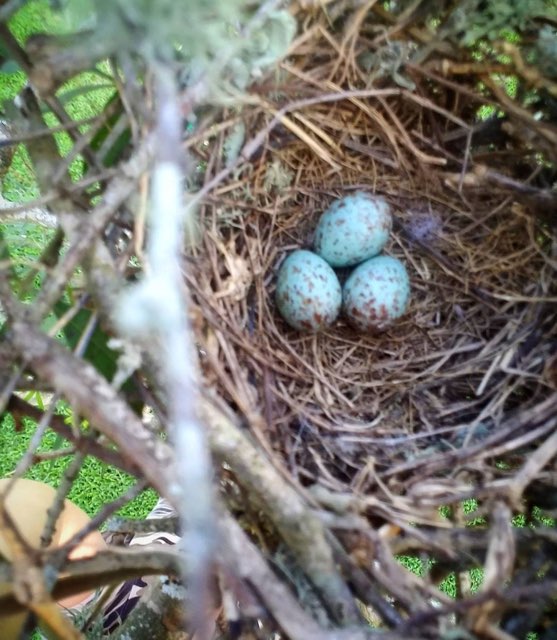
In the springtime, many birds migrate from the south and look for a new place to call home and create a nest. They look for places offering ample shelter from the elements of weather, typically high off the ground, to protect their young. While these birds typically choose trees, shrubs, and other natural sights to build nests, some bird species tend to build them in the crevices of homes, buildings, and bridges.
Bird nests come in many shapes and sizes. Each species has unique methods in choosing a suitable location and constructing nests to house their young. Some species do not build nests at all and instead lay their eggs in the nests of other birds. Those who do build nests generally construct a shell of sturdy materials like sticks, plant stems, and grasses held together with mud. The interior is lined with soft materials like moss, animal fur, dried leaves, string, or bits of cloth.
Furthermore, the nests often harbor pests like ticks and mites. Lastly, bird nests are highly flammable and built with dried plant matter, making them fire hazards.
If you find a nest inside or outside your home, it’s a telltale sign that you’re dealing with a bird problem.
The Migratory Bird Treaty Act of 1918
Although it might be tempting to knock down an unwanted bird nest with a broom or blast of water from a hose, the Migratory Bird Treaty Act of 1918 protects most birds, their eggs, and their nests from being killed or destroyed. If you disturb a bird nest, it may be considered a federal crime that can carry steep fines and possible prison sentences.
You must obtain special permits from state wildlife agencies before you can remove the nests of certain species. Considering the potential repercussions of doing so without proper permitting, it’s best to contact the wildlife removal experts at Critter Control to handle the matter of unwanted bird nests in a legal and humane way.
Bird Sounds
Sometimes, the above signs are harder to find. You might not find those key signs, but instead may hear bird chirping sounds, rustling about, and scratching sounds. While chirping can also suggest a raccoon or bat, birds are often the culprits. These noises can originate from a variety of spaces, including the chimney, garage, gutters, and more.
Property Damage
Bird infestations can quickly become a nightmare, resulting in widespread damage to both residential and commercial properties. If left unchecked, these avians can wreak havoc on structures, potentially leading to costly repairs and even some health hazards. Given the potential impact, it’s important to act quickly to address the problem before serious and expensive damage occurs.
Bird Damage to Residential Damage
Birds damage residential properties in several ways. Common areas affected by this damage include:
- Roofs: Bird nests and droppings can block gutters and damage shingles, opening the door to leaks, water damage, and even reduced structural integrity over time.
- Ventilation systems: Birds like to nest in chimneys or vents, creating blockages that impact your ventilation system, affecting air quality and increasing fire hazards in your home.
- Gardens: These feathered creatures can also destroy your garden by feeding on plants, fruits, and vegetables. Plus, their droppings can carry diseases that harm your plants and soil.
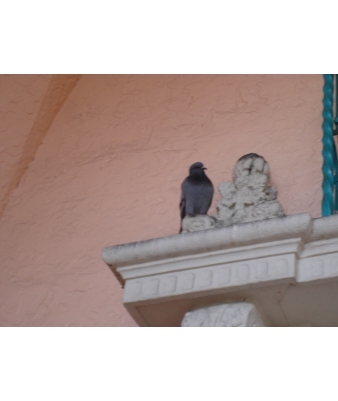
Bird Damage to Commercial Property
As with residential properties, the presence of birds on a commercial property isn’t ideal. Their presence can lead to:
- Excessive noise: Flocks of birds can produce a surprising amount of noise, potentially disrupting business operations by creating an unpleasant environment for employees and customers.
- Disease: Birds can spread harmful bacteria, viruses, and parasites through their droppings, placing employees and customers at risk of infection.
- Wrecked machinery: Bird nests and droppings can interfere with machinery and HVAC systems, potentially leading to malfunctions or pricey breakdowns that disrupt business operations.
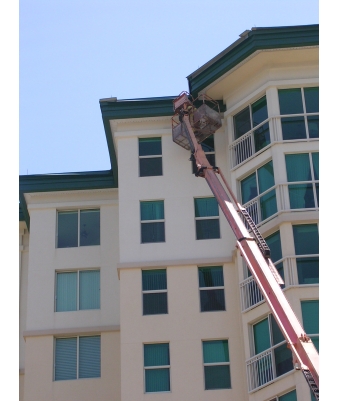
Contact Critter Control for Bird Removal
It’s important not to ignore these signs, as the species may be stuck or looking for a place to nest. If you have birds in the house or around your home, it’s best that you don’t attempt to rescue the birds yourself. Instead, contact a professional wildlife service like Critter Control to humanely remove the birds from your property.
Have an unwanted bird population causing problems in and around your home? Contact Critter Control at 1-800-274-8837 or find an office near you.